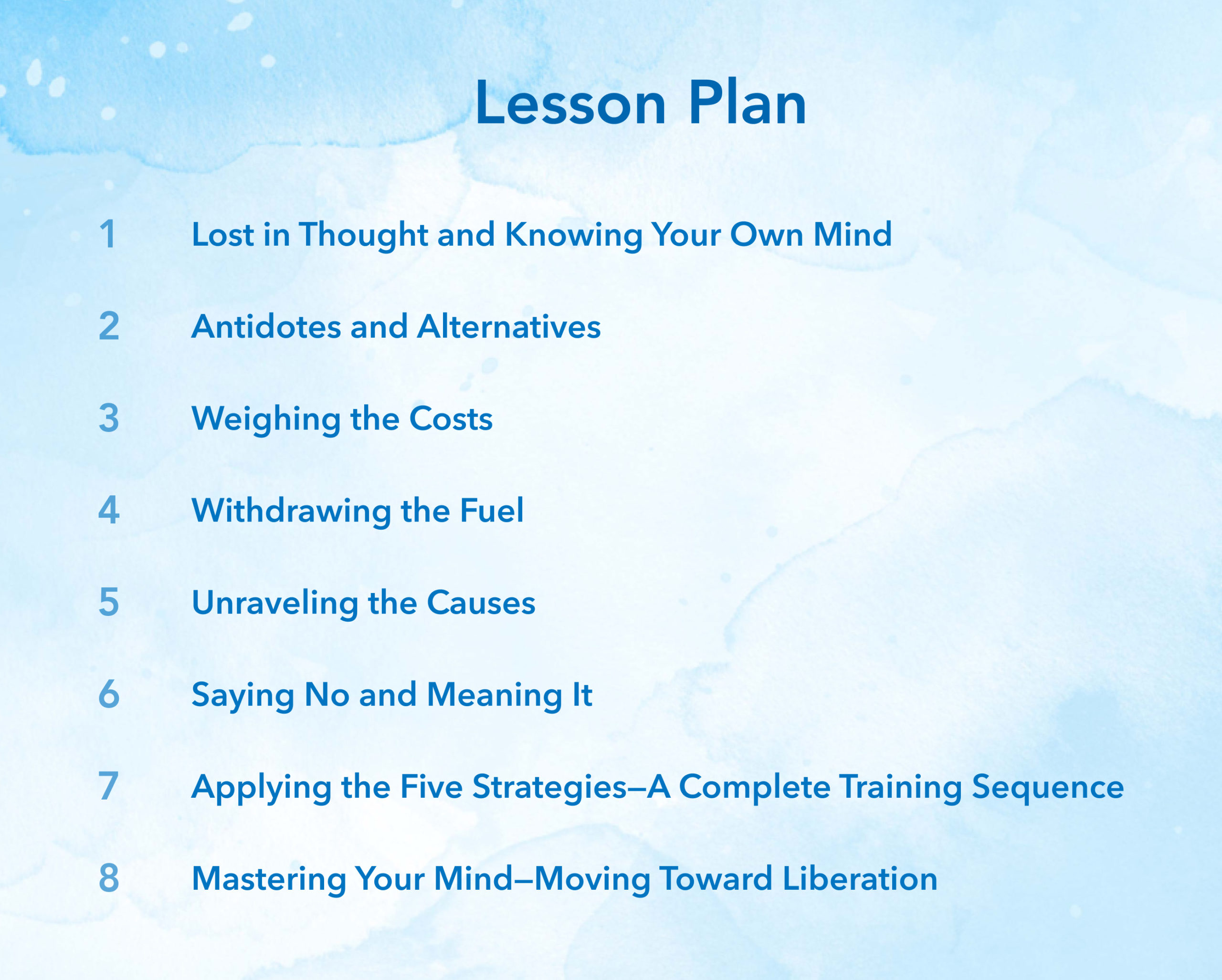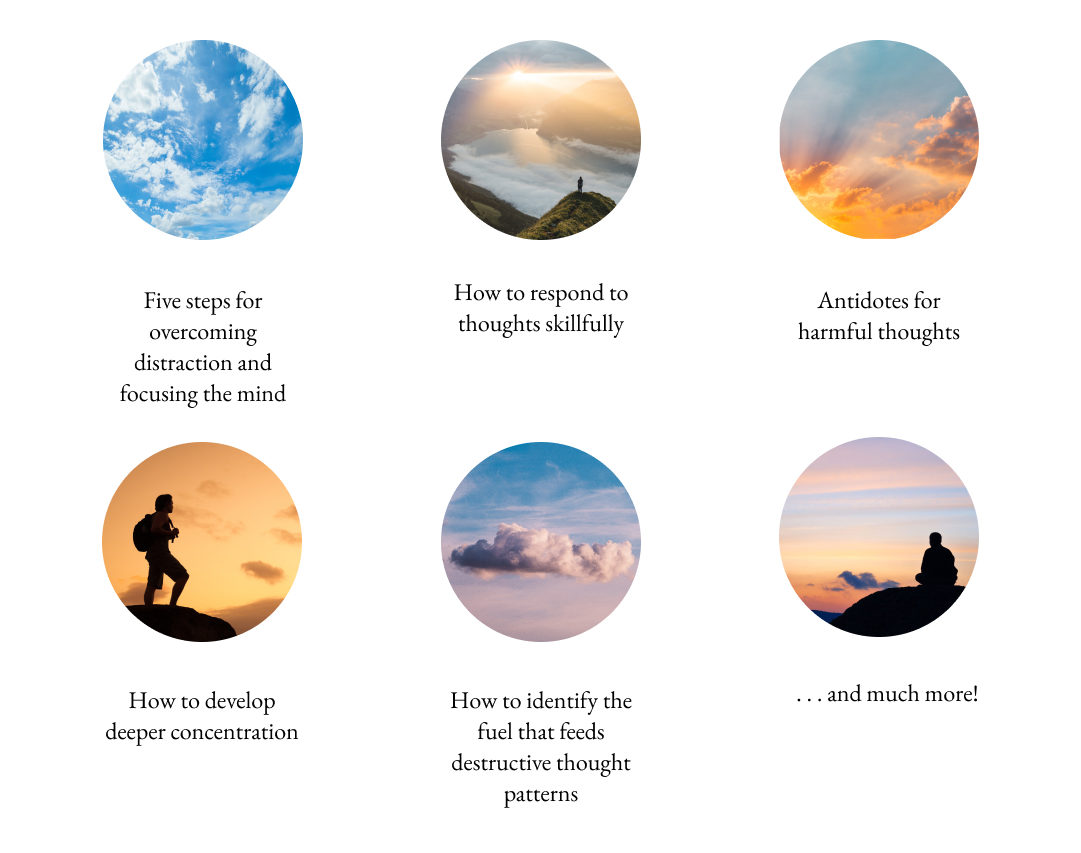
THE WISDOM ACADEMY PRESENTS
Beyond Distraction
Five Practical Ways to Focus the Mind • An online course with Shaila Catherine
Learn how to overcome distraction in meditation practice and develop clarity in your relationships, work, and other activities in this course with highly-respected teacher, author, and jhana expert Shaila Catherine.
You can enroll at any time, take this course at your own pace, and will retain ongoing access to course materials.
Enroll once and then have access to an incredible resource for developing your concentration more and more!
Tuition: $197
Materials remain accessible to enrolled students so you can return to them again and again!
Wisdom is a 501(c)(3) nonprofit. Your tuition supports the creation of more courses like this one. Thank you!
For more about our terms, please see the Wisdom Academy FAQ.
WATCH THE TRAILER
The mind can be a potent tool to spark extraordinary achievements, inspire good works, and advance toward spiritual realization.
However, it can also produce thoughts that lead to suffering. For many people, thoughts run rampant and seem to oppress or control their lives.
Following the Buddha’s pragmatic approach, in this course Shaila guides you through five steps for overcoming distraction and focusing the mind:
1. Replace unwholesome thoughts with wholesome thoughts.
2. Examine the dangers of distracting thoughts.
3. Learn to avoid it, ignore it, forget it.
4. Investigate the causes of distraction.
5. Apply determination and resolve.
Scroll down for more information.

The Buddha tells us that before enlightenment, he sometimes found his mind preoccupied by thoughts connected with desire, ill will, and harm. Through meditation, he figured out how to respond to thoughts skillfully and developed a step-by-step approach to calm the restless mind.
Shaila offers an accessible approach to training the mind, guided by the Buddha’s pragmatic instructions on removing distracting thoughts.

Discover for yourself how the five steps lead to one key realization: In the moment you recognize that a thought is just a thought, you will find yourself on the path to a life of remarkable freedom.
Scroll down for more information, or click the button to enroll now!
• When does the course start? This course is in self-study mode so you can enroll at any time.
• Will I lose access? No, you will retain access even after the last lesson has been released so you can return to the teachings whenever you like!
• Are there any live components? No, besides ongoing forum discussions amongst students.
For more about our terms, please see the Wisdom Academy FAQ.

Lesson 1: Lost in Thought and Knowing Your Own Mind
Shaila introduces the course, observing that the mind can be a potent tool to guide extraordinary achievements, inspire good works, and advance toward spiritual realization. However, it can also produce thoughts that lead to suffering. The content of thoughts do not exist as an objective reality in the world. You can learn to avoid letting the ways you think reinforce attachment to deluded assumptions about self. Wholesome thoughts tend to produce happiness, while unwholesome thoughts tend to produce agitation. By allowing all thoughts to settle through meditation, you can reap the benefits of an undistracted, still mind. Readings include the Dvedhāvitakka Sutta.

Lesson 2: Antidotes and Alternatives
Is your way of perceiving and thinking about life leading to happiness, or is it perpetuating suffering? To prevent unwholesome thoughts from inhibiting your capacity to be genuinely present for life, practice replacing harmful thoughts with more skillful alternatives. Sometimes, just recognizing that a thought isn’t helping us produces sufficient clarity that it ceases. The strategy of replacement is a classic method for addressing hindrances when they arise. Readings include the Vitakkasaṇṭhāna Sutta.

Lesson 3: Weighing the Costs
Distracting thoughts can be defused by clearly identifying their harmful effects. The cycle of distracting thoughts tends to continue when there is an apparent reward. Thoughts are mental events that you can pay attention to; as you recognize the deleterious effects that repeated unwholesome thoughts have on behaviors, relationships, and emotional tendencies, you create opportunities to change habits. As meditative skill develops, thoughts settle, and mindfulness and concentration come forward to support progress on the spiritual path.

Lesson 4: Withdrawing the Fuel
With concentration and clear intention, you can learn to pull your attention away from unwholesome thoughts, and from the signs that trigger them. You have the option of forgetting regrets, grudges, and stories that might otherwise sustain ill will or reactivate traumas. You have the ability to pause and stop unskillful actions of body, speech, and mind. Patterns and habits that trigger defilements might ultimately need to be examined closely, but wait until you have supportive conditions for this inquiry. At times, a skillful withdrawal might be the wisest choice.

Lesson 5: Unraveling the Causes
By understanding the causal conditions that feed mental proliferation, you will be able to withdraw the fuel that feeds destructive thought patterns. Gradually track your thoughts back to find the beliefs or conditions that feed them. Meditative investigation focuses on the dynamics of identification and attachment without veering into psychological analysis or spiraling into constructing new stories based on the results of the inquiry itself. Effective meditative investigation is supported by calmness and curiosity.

Lesson 6: Saying No and Meaning It
Strong determination is the last resort when the first four strategies have been applied, but a more forceful response is still required. You can now say “no!” to that defilement or habitual pattern—and mean it. Strive to apply effort skillfully, not exerting too little effort nor too much. This strategy of strong resolve expresses your heartfelt allegiance and eagerness to progress on your path. Asserting your determination aligns your thoughts with your goals.

Lesson 7: Applying the Five Strategies—A Complete Training Sequence
Following the Buddha’s pragmatic approach, Shaila provides guidance through a complete training sequence for overcoming distraction and focusing the mind: 1) Replace unwholesome thoughts with wholesome thoughts; 2) Examine the dangers of distracting thoughts; 3) Avoid it, ignore it, forget it; 4) Investigate the causes of distraction; and 5) Apply determination and resolve.

Lesson 8: Mastering Your Mind—Moving Toward Liberation
Minds free from distraction have the potential to experience states of deep concentration and liberating insights. Many habitual thoughts project a familiar self-image, and keep the attention grasping at a fictional construct—the story of me. When supported by the stability of a concentrated mind and the continuity of mindfulness, sensory encounters will be known as merely impermanent perceptions, empty of self. This clear, mindful encounter with experience moves us beyond distraction, toward a liberating realization of the insubstantial and empty nature of things.

What You Get
8 lessons
8 meditations
35-45 minutes of video per lesson
1 or more readings per lesson
Short quizzes
A forum for student discussion
Each lesson includes readings and meditations to help you cultivate these five steps to deeper concentration. You’ll learn about your mind and develop your ability to direct your attention more skillfully in meditation and daily activities.
Drawing on the book Beyond Distraction as well as two scriptures in the Middle Length Discourses of the Buddha, Shaila shows how to overcome habitual modes of thinking, develop deeper concentration, and discover insights into emptiness that are vital for a liberating spiritual path.
1. If you want to learn to avoid letting the ways you think reinforce attachment to deluded assumptions about self.
2. If you want to learn how to prevent unwholesome thoughts from inhibiting your capacity to be genuinely present for life.
3. If you want to learn how to develop effective meditative investigation that is supported by calmness and curiosity.

Shaila Catherine has been leading meditation retreats worldwide since 1996, emphasizing deep concentration, jhana, and the path of liberating insight. Shaila is the founder of Bodhi Courses, an online Dhamma classroom, and Insight Meditation South Bay, a Buddhist meditation center in Silicon Valley in California. She has practiced meditation since 1980, studied with founders of Western insight meditation centers, and accumulated more than nine years of silent retreat experience. Shaila spent most of the 1990s practicing with eminent masters in India, Thailand, and Nepal. From 2006 to 2014, she practiced under the guidance of Pa-Auk Sayadaw and twice completed his rigorous training in jhana and vipassana. Shaila loves deep meditation, and appreciates a variety of approaches to exploring, developing, and liberating the mind. Shaila is the author of Focused and Fearless: A Meditator’s Guide to States of Deep Joy, Calm, and Clarity, Wisdom Wide and Deep: A Practical Handbook for Mastering Jhana and Vipassana, and Beyond Distraction: Five Practical Ways to Focus the Mind.
Wisdom is a 501(c)(3) nonprofit organization. When you purchase from Wisdom or make a donation, you are helping us to continue our mission to make the Dharma as widely available as possible. Thank you!









